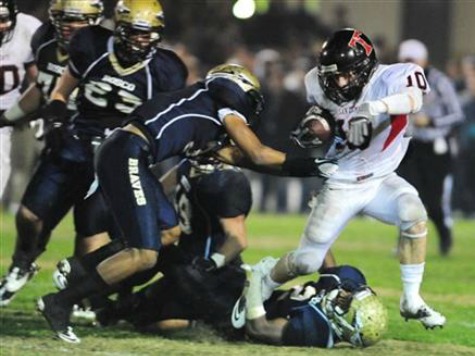Hundreds of high schools today stage football rivalry games whose origins date as far back as 1876.
Technology with a more recent pedigree increasingly plays a role in the ancient Thanksgiving Day traditions. But a pair of researchers say that entrenched equipment manufacturers collude to suppress that technology–and inhibit player safety in the process.
A law journal article calls for the abolition of the National Operating Committee on Standards for Athletic Equipment (NOCSAE) on the grounds that industry representation necessarily corrupts the board’s decisions. Brooke de Lench and Lindsey Barton Straus maintain in the Journal of Business & Technology Law that “equipment-certifiers seemingly value profits and protecting their constituents as much, if not more than player safety.”
The issue pushing the attempt to decertify the certifiers involves tiny sensors attached to helmets that alert coaches to big impacts. Theoretically, this enables them to more easily identify concussions. NOCSAE says helmets affixed with the sensors, weighing an ounce in certain instances, invalidate their certification by the body. The helmet manufacturers, who helped establish the body 45 years ago in the wake of a 1968 season that witnessed 36 player deaths from contact, do not make the after-market sensors in question (but several of the helmet companies make their own versions).
The authors cite a 2013 statement by NOCSAE announcing that “the addition of after-market items by anyone that changes or alters the protective system by adding or deleting protective padding . . . voids the certification of compliance with the NOCSAE standard.” The decision frightened schools and football leagues, fearful of liability by fielding players with helmets not certified by NOCSAE, into steering clear of the impact-sensing devices.
The authors believe that removing the imprimatur to helmets that add a tiny sensor when the addition of a facemask causes no such disapproval from NOCSAE shows that safety doesn’t govern the body’s decision. “NOCSAE’s standard tests football helmets without faceguards, which can weigh up to eight times more than concussion sensors,” de Lench and Straus point out. “Because both faceguards and sensors add ‘mass’ to football helmets, NOCSAE’s policy seemingly should void certification when a helmet bears either product. Likewise, even mud, rain or grass stuck on a helmet should void certification because they, too, add mass.”
“Too Safe to Certify: Impact Sensors, Product Standards, and NOCSAE’S Collusive Motives” argues that the exclusion of helmets with third-party sensors from NOCSAE approval stems from the anti-competitive practices of helmet manufacturers and represents restraint of trade. The industry defends the exclusion on the grounds that it fears liability should helmets, now designed to protect the skull, make implied claims regarding concussions through the addition of the sensors.
Riddell, for instance, has been the subject of an ongoing lawsuit by retired professional players–even ones who wore other brands–as a result of its since discontinued status as the official helmet of the NFL. The legal and insurance costs borne by MacGregor, Wilson, Max Pro, and other equipment producers drove them out of the football-helmet business decades ago. Currently, Schutt, Rawlings, Riddell, and Xenith stand as the main brands of football helmets.
An industry source downplayed the role of liability. “If you make an alteration to the product that was certified, then it’s not the same model that was certified,” the source told Breitbart Sports. The source conceded that NOCSAE’s board holds two spots each for the National Athletic Equipment Reconditioners Association and the Sporting and Fitness Association. He insisted that’s not only very different from direct industry representation, but represents “a minor part of the board.” Medical groups, for instance, constitute the plurality of positions on the board. “We’re in business to protect young athletes,” the source added. “If there’s anything we can do to protect young athletes, we’ll do it.”
But de Lench and Straus, leaders of the Mom’s Team organization that employed the sensors in a 2013 documentary on football safety, see it differently. “In effect, NOCSAE’s decision empowers helmet manufacturers to act as third-party technology gatekeepers,” the pair maintains. They hold that “no amateur sports league would implement a product that voids NOCSAE certification.”
“Riddell does not advocate the decertification of helmets,” the 87-year-old company explained in a statement provided to Breitbart Sports. “To the contrary, Riddell has long been the recognized leader in helmet technology and innovation, and we are supportive of initiatives that better protect athletes. However, there are standards for helmet certification to which all manufacturers are required to adhere. These avenues to product certification are available to all manufacturers seeking to certify their products.”
Daniel J. Flynn, the author of The War on Football: Saving America’s Game (Regnery, 2013), edits Breitbart Sports.

COMMENTS
Please let us know if you're having issues with commenting.